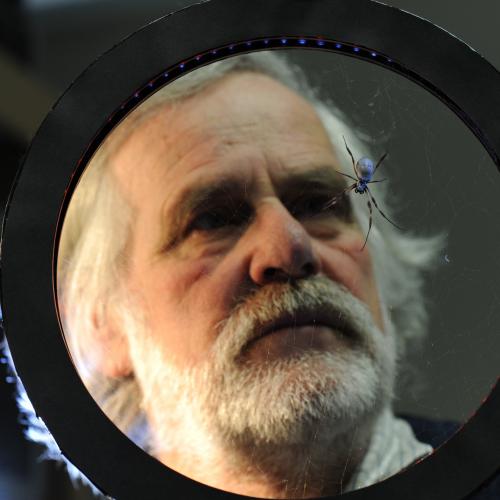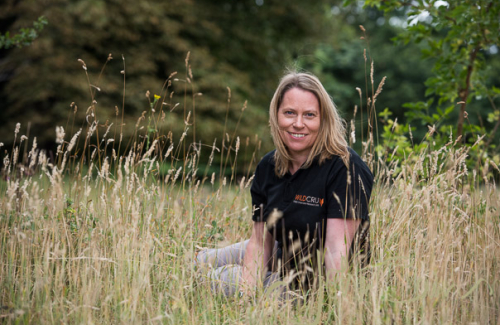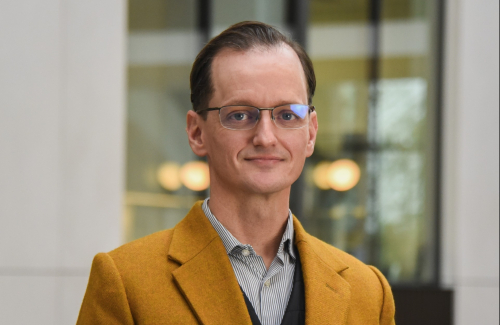
Professor Fritz Vollrath
I am an evolutionary biologist with a rather long history of studying the behaviour, ecology, life history and evolution of spiders, webs and silks. Other biological nano-scale materials have more recently attracted my interest, as have the rapidly growing fields of biomimetics, bionics, soft robotics, and indeed the generic idea of copying concepts from Nature.
In addition, I am deeply fascinated by elephants and their complex (certainly relative to spiders) decision making. As a longterm trustee of Save the Elephants, a UK charity with a research base in Kenya, I have had ample opportunity to study the ecology and behaviour, and increasingly also physiology and genetics, of the magnificent African elephant in its natural habitat.
After an internship with Niko Tinbergen in at the Animal Behaviour Research Group in Oxford I returned to Germany to study Zoology, Limnology, Palaeontology and Physics in Freiburg and Göttingen. An MSc on Pigeon Navigation at Konrad Lorenz's Max Planck Institute in Seewiesen was followed by a PhD in Freiburg on Spider Behaviour working mostly at the Smithsonian Tropical Research Institute in Panama.
I returned to Oxford in on a Royal Society Post-Doc Fellowship with Richard Dawkins to explore the spider's web as an Extended Phenotype which led to a major award of the Volkswagen Foundation to use Artificial Intelligence as a then novel tool to analyse the spider’s web. A move to Basel on a junior Professorship revived my interest in Evo-Devo. A call as Regius Professor brought me to Aarhus in Denmark where with my group and I studied spider web-building and web-engineering. This work continued when I returned to Oxford some years later where the group expanded to include web-silk proteins and their properties. Fieldwork in the Americas, Australia, Melanesia and Africa was always an inspiration, with visits to the Smithsonian/Princeton Mpala Research Centre in Kenya encouraging interests in elephants, initially based on applying advanced spider web-building analysis to elephant movement. This expanded into studies of elephant ecology, physiology, behaviour and conservation by e.g. examining elephant reactions to bees, analysing the economics of elephant motility in complex ecosystems, and evaluating the use of drones in elephant research and conservation. Additionally, my studies of silk protein-folding inspired a fascination with p53, a key anti-cancer protein in many vertebrates, that in elephants seem to have evolved a unique role and modus operandi.
A number of Oxford Spin-outs and Start-ups resulted from my spider and silk research, while the elephant studies are all closed integrated into research projects of the UK Charity Save the Elephants.
For a full list of Professor Vollrath's publications please see:
https://orcid.org/0000-0003-3484-9005
https://scholar.google.com/citations?user=XIeVwI8AAAAJ&hl=en
News from Biology
Professor Fritz Vollrath

I am an evolutionary biologist with a rather long history of studying the behaviour, ecology, life history and evolution of spiders, webs and silks. Other biological nano-scale materials have more recently attracted my interest, as have the rapidly growing fields of biomimetics, bionics, soft robotics, and indeed the generic idea of copying concepts from Nature.
In addition, I am deeply fascinated by elephants and their complex (certainly relative to spiders) decision making. As a longterm trustee of Save the Elephants, a UK charity with a research base in Kenya, I have had ample opportunity to study the ecology and behaviour, and increasingly also physiology and genetics, of the magnificent African elephant in its natural habitat.
After an internship with Niko Tinbergen in at the Animal Behaviour Research Group in Oxford I returned to Germany to study Zoology, Limnology, Palaeontology and Physics in Freiburg and Göttingen. An MSc on Pigeon Navigation at Konrad Lorenz's Max Planck Institute in Seewiesen was followed by a PhD in Freiburg on Spider Behaviour working mostly at the Smithsonian Tropical Research Institute in Panama.
I returned to Oxford in on a Royal Society Post-Doc Fellowship with Richard Dawkins to explore the spider's web as an Extended Phenotype which led to a major award of the Volkswagen Foundation to use Artificial Intelligence as a then novel tool to analyse the spider’s web. A move to Basel on a junior Professorship revived my interest in Evo-Devo. A call as Regius Professor brought me to Aarhus in Denmark where with my group and I studied spider web-building and web-engineering. This work continued when I returned to Oxford some years later where the group expanded to include web-silk proteins and their properties. Fieldwork in the Americas, Australia, Melanesia and Africa was always an inspiration, with visits to the Smithsonian/Princeton Mpala Research Centre in Kenya encouraging interests in elephants, initially based on applying advanced spider web-building analysis to elephant movement. This expanded into studies of elephant ecology, physiology, behaviour and conservation by e.g. examining elephant reactions to bees, analysing the economics of elephant motility in complex ecosystems, and evaluating the use of drones in elephant research and conservation. Additionally, my studies of silk protein-folding inspired a fascination with p53, a key anti-cancer protein in many vertebrates, that in elephants seem to have evolved a unique role and modus operandi.
A number of Oxford Spin-outs and Start-ups resulted from my spider and silk research, while the elephant studies are all closed integrated into research projects of the UK Charity Save the Elephants.
For a full list of Professor Vollrath's publications please see:
https://orcid.org/0000-0003-3484-9005
https://scholar.google.com/citations?user=XIeVwI8AAAAJ&hl=en

